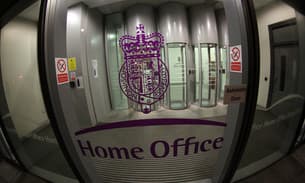
Analysis: The slide into a surveillance state
Fifty years ago, President Eisenhower warned of the ‘disastrous rise’ of the military-industrial complex. His fears proved all too accurate.
Now in the post-9/11 world, the threat goes even further: the military-industrial complex is evolving into the military-intelligence complex. It is a world, I fear, that is propelling us into a dystopian surveillance nightmare.
I have seen this nightmare unfold from close quarters. In the mid-90s I was an intelligence officer for MI5, the UK domestic security service. That is, until I resigned to help my former partner and colleague David Shayler blow the whistle on a catalogue of incompetence, cover-ups and crimes committed by spies. We naively hoped that this would lead to an inquiry, and a review of intelligence work and accountability within the notoriously secretive British system.
The blunders and illegal operations that we witnessed in our six years at MI5 took place at what is probably the most ethical and accountable decade in the British spying service’s 100-year history.
Even then, they were getting away with pretty much whatever they wanted.
Since the attacks of 9/11, I have watched with increasing dismay as more powers, money and resources have been pumped into the international intelligence community to combat the nebulous ‘war on terror’. As a result, civil liberties have been eroded in our own countries, and countless innocent people have been killed, maimed and displaced across the Middle East.
The Regulation of Investigatory Powers Act (RIPA), which was designed to allow our spy agencies to lawfully intercept our communications to counter terrorism and organised crime, has been routinely used and abused by almost 800 public bodies. MI5 admitted to making 1,061 mistakes or ‘administrative errors’ this year alone in its application of RIPA, according to the Interception of Communications Commissioner, Sir Paul Kennedy.
Intelligence creep extends to the police, as we saw with the undercover police scandal earlier this year, where the unaccountable National Public Order Intelligence Unit was discovered to be infiltrating harmless and legitimate protest groups for years on end.
It is a world, I fear, that is propelling us into a dystopian surveillance nightmare.
The rise of corporate spying
Even beyond the undercover cops, we have seen an explosion in corporate spying. This involves mercenary spy companies such as Xe (formerly Blackwater), Kroll, Aegis and Diligence offering not just security muscle in hotspots around the world, but also bespoke operations enabling big corporations to check out staff or to infiltrate and investigate protest groups that may embarrass the companies.
The mercenary spy operates without any oversight whatsoever, and can even be granted immunity from prosecution, as Xe enjoyed when operating in Iraq.
The last decade has also been a boom time for companies providing high-tech surveillance capabilities. One aspect of this in the UK – the endemic CCTV coverage – is notorious. Local councils have invested in mobile CCTV smart spy cars, while cameras that bark orders to you on the street have been trialled in Middlesbrough.
Drones are increasingly used for aerial surveillance – and the potential for militarisation of these tools is clear.
Related article: UK to spend half a billion on lethal drones by 2015
All this despite the fact that the head of the Metropolitan Police department that is responsible for processing all this surveillance information stated publicly that CCTV evidence is useless in helping to solve all but 3% of street robberies in London. In fact, since CCTV has been rolled out nationally, violent crime on the streets of Britain has increased.
But, hey, who cares about facts when security is Big Business? Someone, somewhere, is getting very rich by rolling out ever more Orwellian surveillance technology. And while the technology might not be used against the wider UK citizenry in a particularly malignant manner – yet – the same companies are certainly allowing their technologies to find their way to the more violent and repressive Middle Eastern states.
The intent is the same in Syria and Britain. Only the scale and brutality differs – at the moment.
That would never happen in Britain – would it? We retain an optimistic faith in the long-term benign intentions of our government, while tut-tutting over Syrian police snatch squads pre-emptively arresting suspected dissidents. Yet this has already happened in the UK: before the royal wedding in April, protesters were pre-emptively arrested to ensure that they would not cause embarrassment. The intent is the same in Syria and Britain. Only the scale and brutality differs – at the moment.
When I worked for MI5 in the 1990s I was appalled how easily telephone interception could be used illegally, and how easily the spies could hide their incompetence and crimes from the government. In the last decade it has become much worse, with senior spies and police officers repeatedly being caught out lying to the toothless Intelligence and Security Committee in Parliament. And this is only the official intelligence sector.
How much worse is the endemic surveillance carried out by the corporate spy industry?
The balance of power, bolstered by new technologies, is shifting overwhelmingly in favour of the Big Brother state – well, almost. The WikiLeaks model is helping level the playing field, and whatever happens to this trailblazing organisation, the principles and technology are out there and will be replicated. This genie cannot be put back in the bottle. This – combined with the work of informed MPs, investigative journalists and potentially the occasional whistleblower – gives me hope that we can halt this slide into a Stasi state.
Annie Machon is a former spy with MI5, the British intelligence agency working to protect the UK’s national security against threats such as terrorism and espionage.
You can read Annie Machon’s blog ‘Using Our Intelligence’ here.




